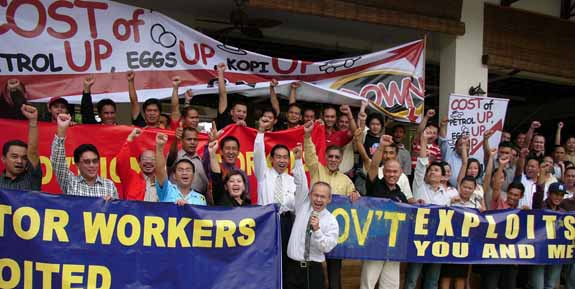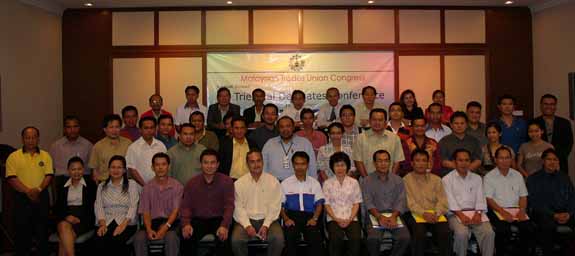26 August 2007
|
||||||||||||||||||||||||||||||||
| Conference Resolutions |
|
|||||||||||||||||||||||||||||||
|
Malaysian Trade Union Congress 3RD TRIENNIAL DELEGATES CONFERENCE RESOLUTIONS ADOPTED 1 REQUEST FOR EXEMPTION TO SLO BY STA 1. We note that the Sarawak Timber Association has requested for to exempt all workers engaged in Forestry Undertakings from certain provisions of the Amended Sarawak Labour Ordinance as follows;
· S11 - Guaranteed Week · S104 – Holidays · S 105 - Hours of Work · S105A – Shift Work · S105B – Rest Day · S105C – Work on Rest Day · S105D - Annual leave,
2. MTUC believe that the STA’s arguments that the sections were not practical to be implemented is nothing more than a cloak to hide the real agenda- i.e. to deny their workers basic rights guaranteed by the amended SLO.
3. Certainly we fail to see how it can be impractical to implement all the said sections in a plywood factory in an industrial estate in Demak Laut, Kemena, Lanang or Baram.
4. Their argument that there are certain entrenched practices and policies only goes to show that they are unwilling to change these entrenched practices that has served the interests of employers, not workers.
5. In REALITY all STA wants is to continue to deny all workers in the timber industry fundamental rights to:
· Public holidays, · Half an hour rest after 4 hours of work, · A rest day after working continuous for 6 days, · Overtime payment for working in excess of normal hours of work · Even annual leave.
6. Their rational that they need workers to work non stop from sunlight till sundown without break and to work everyday for months is the main reason why the workplace accidents and fatality rate of the timber industry is the highest. Workers are literally paying with their life and blood. Now they even want to deny payments like annual leave and overtime.
7. For daily paid workers they even want absolute right to determine the number of days work. This means that they can ask a daily paid worker to come only one day a week or if the weather is good. So in a wet season, the worker cannot even earn any wages at all. Business risk must rest with employers, not poor workers.
8. This is totally irresponsible from an industry that has made billions of ringgit and has spawned some of the country’s richest billionaires. It is indicative of an industry that not only exploits the state’s natural resources, but also its employees, who are mainly from kampongs and longhouses.
9. We failed to understand why timber employers, billionaires and millionaires should be exempted from these provisions, when other employers in other industries are willingly and gracefully granting to their employees. It must be noted that in Sabah and West Malaysia, timber employers there never seek exemption??
10. Please take note that these basic and fundamental provisions are legislated by Parliament with the aim to provide protection to workers. The amendment was long overdue for 45 years and only just implemented recently.
11. Any Minister to even consider to such request can only mean that he is only looking after the interest of employers in an industry that has made billionaires while workers continue to pay with the blood and their lives.
12. We therefore call on the Minister to reject outright the request and to order Labour Inspection officers into the timber camps to inspect the real situation.
2 HONORARIUM1. We are pleased to note that despite difficult circumstances. The Division managed numerous achievements during the term. We also note that the financial position has improved and have managed in a very prudent and professional way. 2. We must recognised the need for our officials to be given a token honorarium to compensate for their time and effort especially in presenting cases at the Industrial Court. We note that all fees and donations collected goes into the Division. We believe that such a move will lead to greater professionalism in managing the Division. 3. We hope that such honorarium also serve as an encourage incentive for other union leaders to serve in the Division. 4. We move that our officials be paid a one time honorarium as follows: Chairman, Secretary & Treasurer $1000, Vice Chairman, Ast. Secretary = $500. 3 TRADE UNION REPRESENTATION1. We note with deep regret the rejection by the Director General of Trade Unions on our affiliates to expand their membership scope to representing employees in industries that have merged. 2. We call on the DGTU to be more proactive and to allow Unions to adapt to the rapidly changing business environment. 3. We further call on the Minister of Human Resources to allow the appeal by SBEU to be allowed to represent all employees in the Financial Services Industries. 4 PROPOSED ALLUMINIUM SMELTER PLANT AT SIMILAJAU1. We cautiously welcome the proposed USD2 Billion Alluminium Smelter plant in Similajua which we believe will bring in foreign investment and will accelerate the economic growth and generate jobs for Sarawakians 2. We are concern that such a huge project will have environmental impact. 3. We call on the government and the companies involved to ensure that all environment concerns are fully addressed managed and any adverse impact mitigated and proper monitoring mechanism be put in place. 4. We also call on the government to ensure that the economic wealth generated is equitably shared amongst all Sarawakians. 5 MTUC Sarawak welcomes Salary Increase for Civil ServantsCall on Government to Introduce Fair wage and COLA1. MTUC Sarawak warmly welcomes the announcement by the Prime Minister that civil servants will get a salary increase of between 7.5 to 35% for public sector employees. On top of that they get a 100% increase in cost of living allowance. This we believe is one of the highest ever.2. We regret that civil servants in Sarawak are not paid the COLA. This is not fair as the Cost in Living in Sarawak has risen faster than in Peninsula Sarawak. The existing Regional Allowance is to pay for the difference in the cost of living. This difference is now much higher in Sarawak3. We are confident that public sector employees will be motivated to increase productivity and improve the delivery and service.4. We hope that businessmen and traders will not take advantage and increase their prices, as this will further burden the private sector employees whose salary, especially at the lower level has lagged behind the public sector.5. The Sarawak Timber Association has confirmed that timber employees earn as little as RM12.00 per day, which is way below the poverty level in Sarawak.6. Top management and senior managers are in the private sector are definitely better paid than government employees, but employees at the lower level have lagged seriously behind. They don’t even get any cost of living allowance.7. We deeply regret that the Government continue to ignore the plight of private sector workers in Malaysia. We note with regret that the Deputy Minister of Human Resources has made misleading statements to Parliament in that a minimum wage would mean that domestic maids will also be paid $900. Domestic maids are not covered by most provisions of the Employment Act.8. GLCs and GLICs either control or have significant stake in major companies in Bursa Malaysia. GLCs control the Plantation sector and even owned and control 3 of the top 4 banks in the Country.9. We call on the Prime Minister, through its investment arms and Government link Companies (GLCs) and Government Link Investment Companies (GLICs) to also increase the salary of private sector employees.10. We also call on the Prime Minister, who is also Minister of Finance to ensure that private sector employees’ salary do not lagged behind public sector, especially at the lower level.RESOLUTION 6 RETIREMENT AGE 1. We note that Malaysia has still the lowest retirement age of 55 years and amongst the highest life expectancy in the world up to 78 for women. 2. Convention wisdom and emphirical evidence and studies have shown overwhelming support for an increase in retirement age to address the following issues. · Rapid Increase in the life expectancy. Decade by decade, life expectancy for older people has risen at unprecedented rates. Rises in life expectancy surely signal better health. Malaysia now has life expectancy of almost 75 for women. · Reducing the cost of pension and burden on governments to provide healthcare. · Increasing the overall productivity of the workforce · Ensuring adequate retirement savings when workers finally retire 3. The only real concern is that increasing retirement age may deny another younger person entry into the workforce. However the government has always maintained we have almost full employment anyway so this is not an issue. 4. We respect the view that that the government and employers may continue to pay salary for civil servants to stay in the service without any commensurate /attendant output and efficiency from them. This must be addressed whether retirement age is increased or not. A worker may be unproductive or productivity whether he is 30, 50 54 or 56 years old. 5. Physical strength clearly declines with age. So, too, do some cognitive abilities. Older workers perform worse than younger ones in tests of working memory and the ability to process complex new information rapidly. However, declines in such capabilities are not crucial for most jobs, especially as physically strenuous ones become the exception in a service-based economy. What matters in today's work place is the mix of skills, experience and character that individuals bring to bear 6. We view that older workers are generally as good as younger workers and older employees show less absenteeism, lower turnover, fewer accidents, higher job satisfaction and more positive work values than younger workers. 7. One reason why older workers are less adaptable is that the skills they had learnt for their trades lost value as the economy shifted away from industry to services. Because they had had less opportunity for formal education, many lacked the foundations in numeracy and literacy that would have allowed them to respond to the new requirements of the jobs market. By contrast, post-war generations, which have benefited from more formal education, should prove more adaptable. 8. MTUC also dispute the views that those who are retiring now have sufficient retirement savings. EPF figures show that on average members has less than $40,000 when they retire. This is hardly enough when the life expectancy for Malaysian has risen to 75 for women and 69 for men. RM40,000 will not be enough to live for 15 years. 9. As to the view that increasing retirement age will deny promotional opportunities for younger employees, such views is only valid in the old fashion human resources thinking that promotion should be based on age and seniority. Promotion must be based on relevant skills and competencies. In a rapid changing environment, experience is only useful if it is relevant experience. 10. The alternative of engaging retirees on year-to-year contract is limited to high-ranking officials only. This in itself actually denies those immediately below them promotion opportunities. Example. Director of a Department is 56 and retires this year. His deputy is 54, retires in two years. So if the Government extends the contract the contract of the director for another two years. The Deputy would have retired by then, without the chance to be promoted to Director. 11. MTUC Sarawak therefore calls on the government to increase the Retirement age to 60 years. 12. We further call on the Government to increase the rate of contribution to the Employees Fund to 20% for employers and 15 % for employees to ensure that workers have adequate savings when they retire |
|



